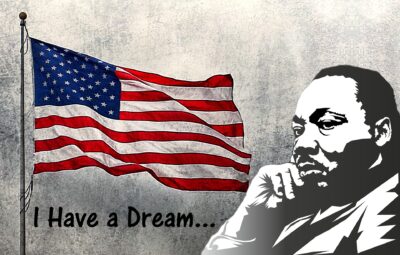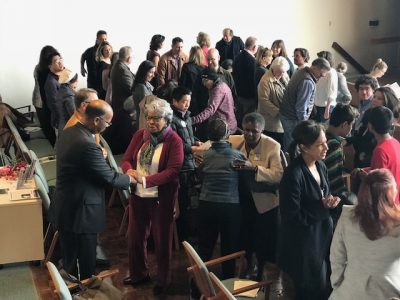The slow, brutal public execution of George Floyd has ignited international outrage. White people are becoming more conscious of what black people have known for centuries about the deep, violent, pervasive, structural, systemic racism within this country. I’ve been wondering, is this movement sustainable, and what can we do to sustain it?
Related to this desire, and as we consider our priorities as a church for this fall, I would like to share with you this week’s E-Letter reflection from our Conference Minister Diane Weible: (copied below)
Blessings upon your week, Pastor Laurie
Let’s Talk: About 8 Minutes and 46 Seconds
By Conference Minister Diane Weible
Each morning I spend 8 minutes and 46 seconds in silence. My thoughts go in many directions and over the next many weeks I hope to share some of those reflections here. Today I want to share two things that came up for me and one leads into the other.
I want to ask our churches in this Conference to seriously consider waiting until 2021 to return to their sanctuaries for worship. I am not making this ask just because I believe that the unknowns of COVID-19 makes it unsafe to consider returning too early. I am also not asking this just because it pains me to think that our communities of faith will be divided or members will feel excluded because they cannot safely return yet.
I ask this because I believe making a decision now to not consider returning to our sanctuaries until 2021 will free up precious time for us to focus on the other virus that we are dealing—that we have been dealing with for 400 years—COVID 1619. Instead of spending time every month debating if now is the time and what safety measures still need to be put into place, we can engage in the hard work of addressing white privilege, dismantling white supremacy and racism, working for equity and justice and co-creating the new ministry that God has revealed to us through these months of sheltering in place and the movement for racial justice that has reached all of us in new and profound ways the past couple of weeks.
And that brings me to the other thing that came up for me that I lift up as an example of the kind of work I am doing in my own life so I can better show up with all of you in this sacred work. The other day during my 8 minute and 46 second time of silence, I started thinking about the concept of “whiteness.” When we say someone is black or brown, we are referring to their skin color. Very few of us who check the “white” box on ethnicity forms would call our skin color white.
A couple of years ago I was at the PAAM Convocation and a dear friend said, “Well, peach people like you…” I looked at her for a moment, confused. And, then I burst out laughing. She was right. In the crayon-box of life, my skin is a lot closer to peach color then it will ever be to white.
White is a construct. It was created to define who holds the power and privilege in a dominating society. It was created for bonded labor that came to the United States and had to work to get out of debt. The white construct allowed these labors to feel superior to newly arrived slaves from Africa. The owners were worried about an uprising if the laborers and the slaves, both desperate for basic human rights and dignities joined forces. If bonded laborers received benefits for being “white” they would feel superior to slaves and the owners could better control all of them.
I am white by a definition that was created to protect the wealthy and powerful in a dominating society that holds a single narrative as the only reality that counts. Anything that happens that doesn’t fit with what we expect from that narrative must be discredited, claimed as untrue, not believed. The cost to me as a person who shares many of the aspects of that single narrative is that my authentic and beautiful story and history is not told or shared because the culture I grew up in encouraged me to focus on how similar we are all—how connected we all are. It allowed me to call a story or reality I don’t understand as “weird” or “different.” It taught me that it’s ok to be so absorbed in my own story, my own reality, that I should expect that everyone shares the same reality as I do and if they don’t, the problem must be with their story, not mine.
People who do not share in the single narrative of society have to navigate both their own authentic story with the story that the dominating society has deemed THE narrative. The white construct is as fragile as a house of cards. If we begin to truly listen to someone else’s story and learn the truth and reality of what we have for four hundred years ignored, our house of cards will topple.
My hope and prayer is that this is what is happening today. The house of cards is falling. As people of faith, we have an important role to make sure that happens. We are learning that we are not white. Instead, we are infected with a virus that is not new but is also deadly. As a peach person, I have been infected with the COVID-1619 virus for four hundred years. There is a vaccine, but unfortunately, it takes a lot more work than just getting a shot.
- It requires one (or many) conversations with a Person of Color to hear their story; to hear of their experiences in our society and world.
• It requires reading books by Authors of Color. It requires watching movies like “The Hate You Give.”
• It requires reading about the deaths of Black people for doing things that those of us with privilege take for granted. (https://demcastusa.com/2020/05/29/i-have-privilege-as-a-white-person-because-i-can-do-all-of-these-things-without-thinking-twice/ ).
• It requires that we read White Fragility, not because we think we already understand privilege and fragility but because there is always something more we need to understand about our privilege and what will be required to dismantle white privilege and white supremacy.
• It requires that we show up for protests now and we commit to showing up for protests and events that will happen in the future.
• It requires not just showing up for protests but that we show up in relationships. Silence in the face of bigotry and racism is equally brutal.
• It requires expanding your circle of relationships beyond those who share the same story or skin color. Who are your neighbors? Who are the people you call friends and why? Do you know their story? How has their story shaped your view of the world?
The time is now. Many of us understand a lot with our heads. We are being invited to embody that knowledge throughout our entire being so we can understand it in a new way. I envision a Conference-wide commitment to conversations within our churches and among all of us in the wider church. These conversations and commitment to action has the potential for transformation and co-creation. I pray you will join me.





